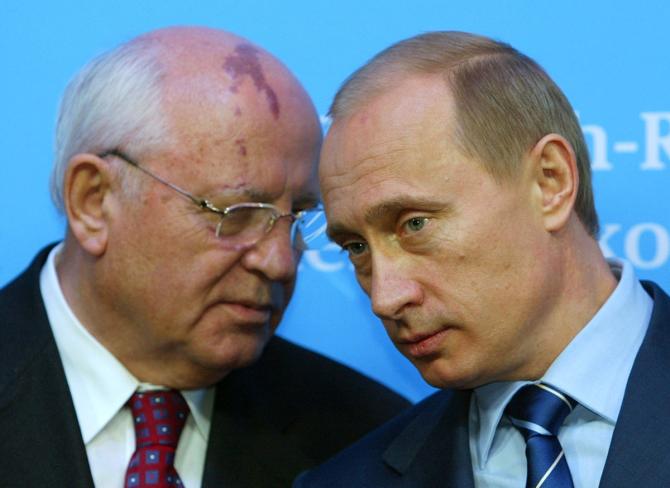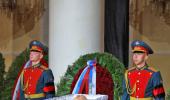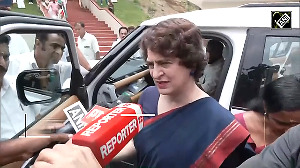'There is only one common feature between Gorbachev and Putin.'
'They are both patriots, and both try to save Russia and make it great.'
'But in very, very, different ways.'

"Gorbachev's clumsy reforms created an electoral basis for Vladimir Putin's rule," says Dr Dmitry Novikov, deputy head, associate professor, Faculty of World Economy and International Affairs/School of International Studies at the National Research University - Higher School of Economics in Moscow.
"Everybody thinks Gorbachev was too weak a leader in such difficult times. However, he was the father of modern Russia. And we have a proverb in Russia -- you never choose your parents," Dr Novikov tells Rediff.com's Archana Masih in an e-mail interview discussing Mikhail Gorbachev's contradictory legacy and why Vladimir Putin despised him.
The first of a two-part interview:
Mikhail Gorbachev was a historical figure celebrated around the world, particularly in the West for ending the Cold War, but criticised -- even reviled -- for presiding over the dissolution of the Soviet Union.
What is the legacy that he leaves behind?
Gorbachev was a very contradictory figure in Russian history and left a very contradictory legacy.
On one hand he gave people the most important thing -- freedom, a right to make independent decisions, both in political and personal life.
After eighty years of oppressive Communist rule, where the party tried to control almost every move, it was a breath of fresh air. But the price was extremely high.
It was not only the collapse of the Soviet Union, what many Russian people still consider to be a catastrophe. But economic collapse made people suffer so much, that a lot of them turned their sympathies back to the 'iron grasp' -- they think it is better to have a strong government without a lot of freedom, but with a particular level of stability.
Therefore, to some extent, Gorbachev's clumsy reforms created an electoral basis for Vladimir Putin's rule.
What were his last days like? Was he largely a forgotten figure towards the end of his life?
Since the mid-1990s, when he tried to make his last comeback into politics, Gorbachev led a very quiet private life. He focused more on charity and support of some research projects.
However, Gorbachev was not and would never be forgotten in Russia -- even after three decades any political 'kitchen talk' involves debates about the Soviet collapse.
Of course, Gorbachev stays in the centre of any such discussion. Soviet-lovers criticise him for his inability to save the Soviet empire. Liberals criticise him for being too inconsistent and in fact too authoritarian.
Everybody thinks he was too weak a leader in such difficult times. However, he was the father of modern Russia. And we have a proverb in Russia -- you never choose your parents.

President Putin held him directly responsible for the ruin of the USSR, for the collapse of the Soviet Union and loss of influence in the world. What accounts for Mr Putin's deep rooted contempt for Mr Gorbachev?
Putin once called the collapse of the USSR 'the largest geopolitical catastrophe of the XXI century'. For him personally, Gorbachev's policy was an act of incompetence or betrayal.
For more than two decades Putin has tried to correct Gorbachev's mistakes: To make Russia a global power to centralise the political system, to make the West respect Russian vital interests.
Of course, it makes him very critical about Gorbachev's legacy, both politically and personally.
How would you compare Mr Gorbachev and Mr Putin as leaders? Mr Putin has been in power for more than 20 years, what has he achieved that Mr Gorbachev did not?
It is difficult to compare them. I would say that they are totally opposite to each other. Gorbachev was an idealist, while Putin is a total pragmatist and realist.
Gorbachev fought the repressive machine and tried to democratise Russian/Soviet society, Putin tries to control it.
Gorbachev wanted better relations with the West, Putin -- well, at first he also tried to have stronger ties with the Western countries, but finally we are where we are.
I believe there is only one common feature between them. They are both patriots, and both try to save Russia and make it great. But in very, very, different ways.
Feature Presentation: Aslam Hunani/Rediff.com










 © 2025
© 2025